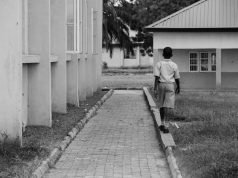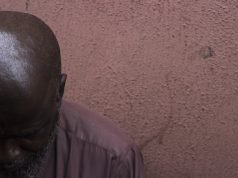By VALÉRIE BAH
Just before Sunday feast the cheese maker hovers over the pasteurizer, checking on the last batch of curd. He dips a thermometer into the vat and reads it, bowing his head with the same reverence he displayed during the homily. He inhales the pong of curd and wax sealant. As a boy, he choked on the stink of squalid latrines in an orphanage, not ten kilometers away. He and his fellow wards preferred to squat further down the valley in plain view of masticating cows.
With his current stock of twelve cows, he has enough to feed his wife, their six children, and slip money into the palms of childhood mates, some of whom had grown indigent or mad, blustering around town reciting dictatorial speeches in hats and thick framed eyeglasses devoid of lenses.
His wife paces in the kitchen, reheating the heaping pots of fufu and eggplant she prepared at sun-up. The cheese maker’s children squirm out of their dress clothes. They play in the front yard, leading a pet baby goat under the watch of their sentry, a distant cousin. The baby goat is skittish with a humanoid bray that the children mimic for fun. The cheese maker’s wife is fond of the goat but anticipates that her children will tire of it when it ages.
A partial inventory of the things the cheese maker possesses include: Four fridges containing a week’s supply of whole milk, which his wife locks up with keys she keeps on a ring; A semi-industrial pasteurizer purchased and delivered with the help of the sisters of St. Anne; Two labelling guns with which he marks his cheese wheels with his name, address, and cell phone number; An industrial oven, which has a busted piston and requires regular fixing; A family-sized stove and oven, over which his wife sweats every morning; Sundries; A pet baby goat.
Had a gang from town raided his farmhouse while he was at Sunday church service at the parish of St. Anne, they would have merely vandalized his stocks of gouda-like cheese and milk. By then, he would have been greeting the sisters, just a few minutes’ ride away on his squeaky bicycle.
Now, the victuals are laid on the table and the cheese maker has swiped the first mound of fufu. The baby goat, tied outside for the night, starts to bray. The sound does not bother the cheese maker and his children, while the wife, despite years of living alongside beasts and falling asleep to the rhythm of crickets, cannot shake off her urban upbringing. She makes a mental note to cycle the goat into her family’s nutritional regime earlier than planned.
The goat is restless, she is the first to remark.
When the braying intensifies, she stomps to the side entrance, flings it open and gasps at the sight of red-eyed young men. She is overtaken by the reek of alcohol and glue.
*
The first to hear the news of the cheese maker and his family’s massacre is a nun from St.Anne who, just that day, shook hands with him, his wife, and their fidgety children on their sprawling estate. She liked the cheese maker and his modesty.
A banging at the courtyard gate calls her away from the hush of vespers. The last hammering of this sort heralded riots. The foggiest-minded nun on the grounds remembers the year a familiar parish was burned down with its congregation hollering inside. Among the charred corpses were the most prominent owners of land, cow, and wildflower. Farmers comfortable enough to think beyond the mouths of their relatives. Gangs of young men wielding machetes brambled through the hills, stormed farms, hacking at livestock and obliterating figurative and literal branches of family trees.
She skips down the church steps and trains her eyes on the barbed wire fence. Behind the gate, one of the cheese maker’s security guards sways. His left arm hangs on a tendon. His posture is lopsided and his eyes bulge. She grips his good arm with her manicured hands. He babbles. Family dead. Most cows lie dead in the field. All hacked beyond recognition. Even the goat was slaughtered.
*
Two weeks later, in the town that anchors the hills, a woman enters a supermarket. She is doing the weekly shopping. She carries a notebook containing her Madam’s shopping list in which the first item is cheese. She finds an empty gap in the horizontal refrigerator where she would usually find it. She furrows her brows and taps a finger on the rest of the shopping list, consisting of imported biscuits, teabags, frozen chicken, spinach, canned tomato, and beans. She makes the rounds down the aisles, and asks an attendant about the cheese.
All out, he replies, shrugging.
She arrives at the checkout line, and stands behind two people she knows not personally, but intuitively, by their morphology. Members of the first ethnic group possess a rounder forehead, her uncle used to say. The second have a natural scowl, he also insisted. She stands behind a man paying for a bottle of whiskey and a mother holding a gurgling baby who hangs over her shoulder. The woman tucks away her shopping list and smiles at the baby, taking in his large forehead.
She walks out of the supermarket toward a bus shelter. A young man urinates against the building behind it and turns his head and glowers as she stops. She comes from the countryside of rollicking emerald hills and ferrous dirt that sprout wildflowers and cows, to the effect of silky milk. Though they have neither deed nor land title, her father cautioned her against town, its idleness, dismissing it as the devil’s playground. She boards the bus when it arrives. After two years in town, she can now distinguish the provenance of the stranger seated next to her on public transportation. She leans her head against the window. They drive past a dusty knot of buildings, past the technical institute in which she heard you could learn information technology or accounting. She has never climbed the buildings’ granite steps, she learned to flinch and read at home at the mercy of her mother’s impatient slaps.
*
She finds her Madam at the apartment, supine in front of the television where she had dictated the shopping list over the din of a television soap. Madam doesn’t look up, but the woman quickly closes the door behind her so as not to let the conditioned air escape. She scuttles to the kitchen with the bags and starts to stock the pantry with imported biscuits and frozen chicken and spinach and canned tomato and beans. She flinches when she notices that her madam has followed her and is peering and wheezing behind her.
Where did you leave the change?
In my pocket, Madam, here it is.
Did you find cheese?
No, Madam, they were out.
Madam is now pacing the kitchen in that way that suggests she wants something very much.
How were they out?
I don’t know Madam. They just were out.
Madam looks through some of the other bags, as if she would perhaps still find the cheese there.
Finally, she says: That’s too bad. I wanted a sandwich.
Valérie Bah‘s fiction and non-fiction have appeared in several anthologies, including Spartan and Speak Out: Stories of Pride, Courage, and Social Justice.
This is the third of a set of Writivism stories Saraba will publish in the months of June and July. To find out more about Writivism, please visit the official site.
































[…] Rotimi Babatunde in the programme and her story, Curd (written under mentorship) was published by Saraba earlier this year. Her writing and photography focuses on human interest […]
Comments are closed.